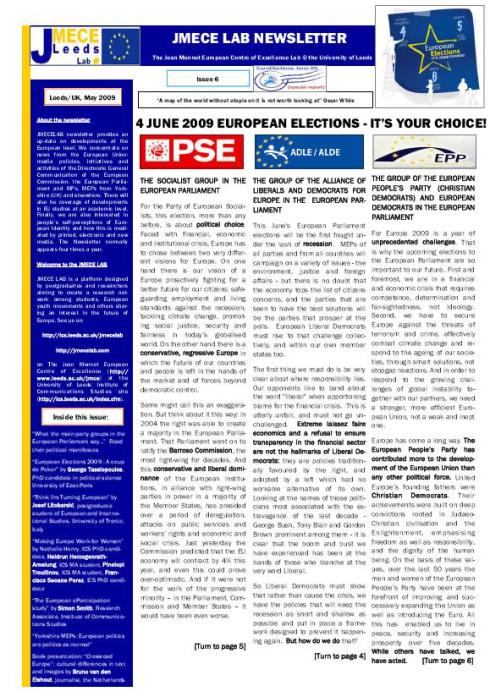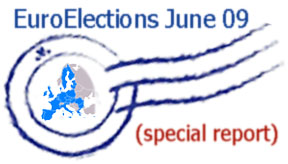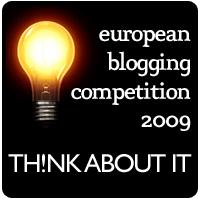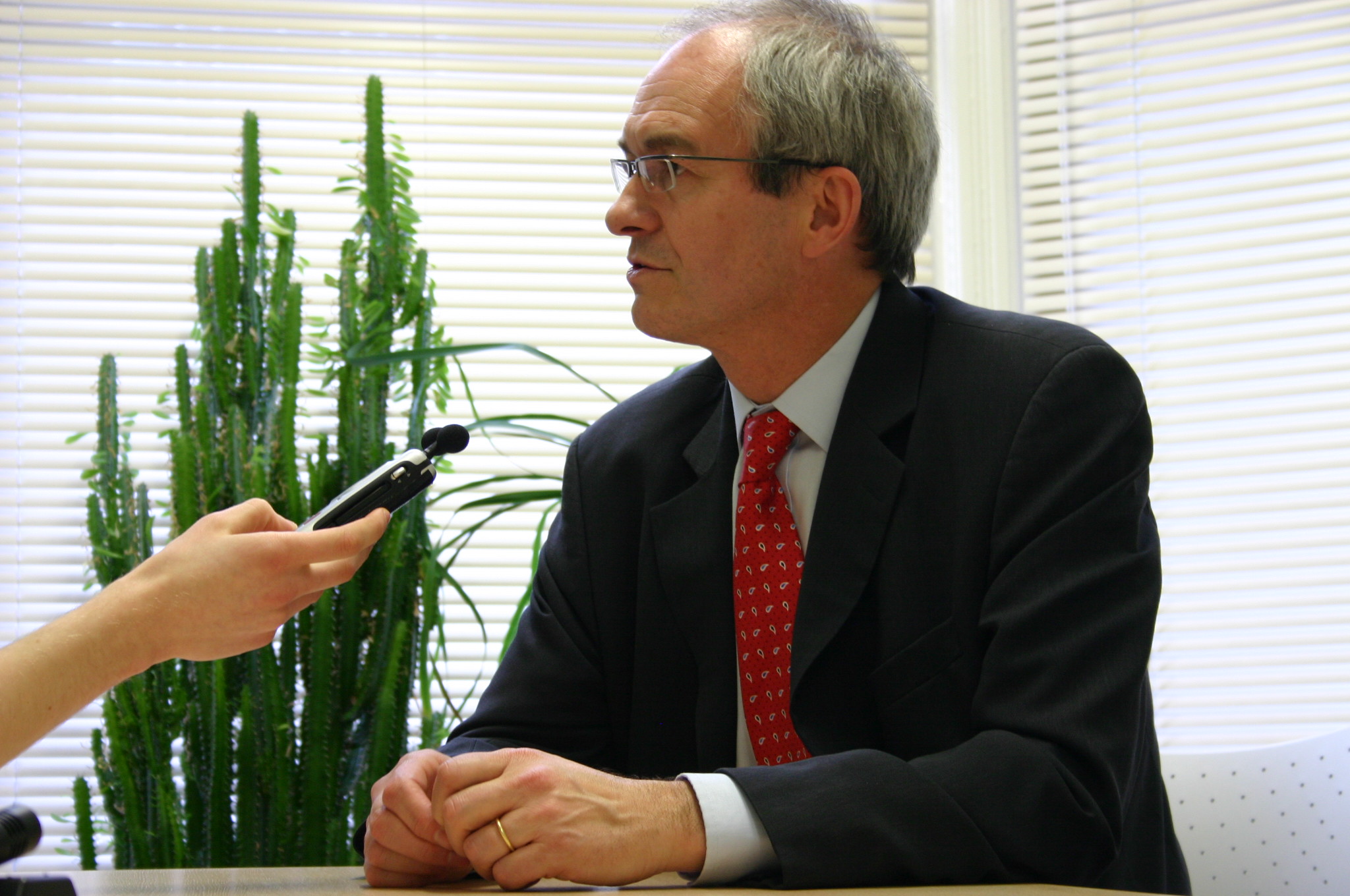You are currently browsing Stergios Mavrikis’s articles.
The 6th newsletter of the JMECE Lab (www.jmecelab.com) at the Institute of Communications Studies (University of Leeds) is available online HERE:
Inside this special issue on European elections 2009: “Vote or let someone else decide for you”:
– “What the main party groups in the European Parliament say…” Read their political manifestos
– “European Elections 2009 : A coup de Poker” by George Tassiopoulos, PhD candidate in political science University of East-Paris
– “Think I’m Turning European” by Josef Litobarski, postgraduate student of European and International Studies, University of Trento, Italy
– “Making Europe Work for Women” by Nathalie Henry, ICS PhD candidate, Heidrun Herzogenrath-Amelung, ICS MA student, Pinelopi Troullinou, ICS MA student, Francisco Seoane Perez, ICS PhD candidate
– “The European eParticipation study” by Simon Smith, Research Associate, Institute of Communications Studies
– “Yorkshire MEPs: European politics are politics as normal”
– Book presentation: “Crossroad Europe”: cultural differences in text and images by Bruno van den Elshout, journalist, the Netherlands
JMECE Lab news:
- “Leeds at the Agora of the Women of Europe prizewinners”, Rhodes, April 2009
- “30 May 2009 / Euro elections 2009 Promotional Event: St Mary’s spring fair, Middleton, Leeds”
- “22 May 2009 / Euro elections 2009 JMECE Lab Events: Leeds University Campus & Leeds City Centre”

To what extent and in which areas can the Europarties’ campaigns be similar or different to national campaign styles?
By: Centre for European Studies
Academics should not only concentrate on analyzing and explaining the elections post-factum – that is, writing books and articles some time after the elections – but also to offer reliable accounts of valid political events as they are taking place. Contrary to most other blogs devoted to the European Parliament elections, my analytical perspective will usually include the historical reflections and comparisons to six previous direct EP elections, taking place since 1979, and will also offer a background and comparisons to the wider literature on the elections and political parties in general. In this sense, it will be both informative and polemic. I am convinced that there is a large number of Internet users who look for such type of analysis and by providing them with it I can contribute my small part to stimulate the debate on the EP elections in an EU-wide perspective. Furthermore, I do hope that some readers will take a little while to enrich this blog by commenting and discussing some of my thoughts, thereby writing it together with me.
The first group of entries will be devoted to the role of the political parties at the European level, also known as the Euro-parties. The Euro-parties should not be confused with the political groups in the European Parliament. Whereas the latter concentrate on the parliamentary activities, the former focus on coordinating the partisan activities within a much larger perspective, mainly but not exclusively, between national political parties. Among the largest and most well known Euro-parties are the European People’s Party (EPP), uniting Christian democrats and conservatives, the Party of European Socialists (PES) and the European Liberals Democrats and Reformers Party (ELDR). Altogether there are 10 Euro-parties. Political scientists agree that the notion of the ‘political party’ found in the names of the above mentioned organizations to a large extent differs from that of national political parties, mostly because they do not run for power and do not have direct membership. For many years the Europarties focused on developing the coordination mechanisms, building a space for communication and exchange of views, and developing a sense of commonality and shared goals. In other words, they used to be typical coordination forums or umbrella organizations for national political parties. Over time, the major Euro-parties also began to organize the summits of their leaders on the eve of the subsequent European Councils, thus entering much more visibly into the EU political system. What they are facing now – i.e. campaigning in the European Parliament elections – is an even more important change, as they been given a chance to contribute to the electoral success of their member parties, and thus, become relevant to all of them. However, how they can achieve this given the national-based, rather than European, focus of these elections? How can they fulfill their electoral role given that hardly any EU citizens know about their existence? To what extent and in which areas can the Europarties’ campaigns be similar or different to national campaign styles? These are just some topics that I will discuss in subsequent blogs, and I warmly invite you to read and comment on them.

Does the EU understand its own past?
Source: Euro Parliament
Europe’s 20th century left a continent shattered by World Wars and Fascism and Communism. As Western Europe recovered after 1945 and went on to build a European Union based on democracy and open markets, countries behind the Iron curtain endured Communist rule. A recent public hearing looked at life under Communism and how little it is understood in west. Two decades on from the fall of the Berlin Wall and with West and East united, we want your opinion: “Does the EU understand its own past?”
Does the EU understand its own past?
If EU countries have emerged from sharply contrasting experiences, not yet sufficiently understood by each other, what of the EU as such? The EU has its own history, one emphasising democracy, unity and peace, but as the EU has enlarged to encompass 27 member states, does that history fully encompass the historical experience of all its citizens, including all those who lived much of the period since the founding of the EU under totalitarian, authoritarian and undemocratic regimes?
As part of this effort to create a better understanding of European history, the hearing – ‘European Conscience and the Crimes of totalitarian Communism: 20 Years After’ – on March 18 in Brussels brought together MEPs, European governments and NGOs. The discussion focused on how Europe should reconcile itself to its totalitarian legacy. It came ahead of a resolution MEPs adopted on 2 April to call for 23 August to be a Europe-wide day of remembrance for victims of totalitarianism.
West is West and East is East: different perceptions
Estonia was one of the countries swept back into the Soviet Union at the end of the war. Estonian Christian Democrat MEP Tunne Kelam chaired one of the panels at the hearing. He told us that it still surprises many Western Europeans that in the ten years following World War II “1 million people were killed in Central and Eastern Europe liberated by the Soviets”.
The consequences of this are that “today there are 10 of millions of citizens in Central and Eastern Europe who have or whose parents have suffered whose sense of justice have not yet been satisfied”.
Hungarian Christian Democrat MEP György Schöpflin told the hearing that “the West regards this issue as irrelevant as it gets in the way of everyday business” and that “Communist crimes are less important than Nazi ones”. He said such an approach “eats away at East-West relations”.
“90% never heard of Gulag”
Camilla Andersson from the Institute for Information on the Crimes of Communism in Sweden told the hearing about public perceptions on Communism and Nazism. In a recent survey of students aged 15-20 it found that 90% had never heard of the Gulag whilst the same number were well informed about the Holocaust. In addition 40% believed that Communism had contributed to increased prosperity in the world.
For the Presidency of the EU, the Czech Europe Minister Alexandra Vondra said that “knowing our past is also an essential tool to teach our children how to avoid intolerance, extremism and the recurrence of totalitarian rule in the future”.
Emmanuel Zingeris for the International Commission for the Evaluation of the Crimes of the Nazi and Soviet Occupation Regimes in Lithuania commented: “This is not an issue of left or right, this is an issue of the fate of our nations and that of millions of victims. We should not equal Nazism and Communism; gas chambers were not the same as gulags.”
In Romania the secret police – the Securitate – were particularly notorious. Marius Oprea from the Institute for the Investigation of the Communist Crimes in Romania told those gathered that: “More than 10,000 people were shot without any sentence by the Securitate, and out of the 1 million political prisoners more than 10% were killed during detention.”
Day of remembrance for victims
MEPs in a resolution adopted on 2 April called on European governments to establish 23 August as a Europe-wide Remembrance Day for the victims of all totalitarian and authoritarian regimes. It would mark the date of the infamous Hitler-Stalin pact of 1939 which enslaved millions. In a resolution on European conscience and totalitarianism they say “there can be no reconciliation without truth and remembrance”. They want the past to be documented and archives opened.
What has Europe ever done for us?
Source: European Movement
The European Dream
source: Wise Enterprise
Nicolas Sarkozy “Turkey is not European!”

“Eleftherotypia” the second best-selling quality newspaper in Greece dedicated a page on the Thinkaboutit.eu project
It seems people do read what we write here on the Thinkaboutit.eu platform. “Eleftherotypia” the second best-selling quality newspaper in Greece dedicated a page on the Thinkaboutit.eu project.
I translate few of the remarks:
“[…] different kind of news and inside information about the EU can be found on the website www.thinkaboutit.eu, acting like a large newsgathering organisation…[…]
[…] George Jiglau mentions that euro-elections seem like national elections which eventually lead to the European Parliament […]
[…] Ari decides to talk in one of his article on about the 10th anniversary of NATO bombings against Serbia and it seems he must be the only non Greek who is referring to our neighbouring country with the full name FYRO Macedonia… […]
[…] Mats feels bad because his fellow citizen from Europhiles became Euro-ignorant […]
[….] Talking about the Communications policy Stergios says that “what is NOT needed are well-paid Brussels based civil servants “playing” at being journalists, or communication policy makers appointed by indifferent national governments achieving indifferent goals. Communicating Europe cannot be an automated procedure. You cannot simply push a button to win the minds and hearts of individuals.” […]
[…] George Georgoudis mentions that the EU “should take some clues from the US, where President Obama seems to revitalize “Brand America” after the disastrous Bush years”. […]
The results of the Thinkaboutit.eu initiative seem already self-evident: few weeks before the Euro-elections, the euro-debate in Greece and elsewhere might seem dead, however, there are young people who are interested. On top of that, they dream of a different Europe. In conclusion, if politicians are searching for inspiration, let them switch on their computers.”
Article in Greek: http://www.enet.gr/?i=news.el.article&id=36462&ref=search
Το Κόμμα Νεολαίας Σλοβενίας (μέλος των ευρωπαίων Πρασίνων) αναζητεί υποψήφιους για τις ευρωεκλογές… στο Facebook. Στη Λετονία, το κοινωνικό δίκτυο draugiem.lv παρουσιάζει σε ηλεκτρονική μορφή όλα τα προγράμματα των κομμάτων. Στη Βρετανία, το Jury Team (το «κόμμα χωρίς πολιτικούς», όπως το διαφημίζουν) δίνει τη δυνατότητα σε όλους τους πολίτες να δηλώσουν την υποψηφιότητά τους (έναντι 10 λιρών για «έξοδα φακέλου»). Οι Βούλγαροι, τέλος, δεν διαχωρίζουν τις ευρωπαϊκές από τις εθνικές εκλογές, αντιμετωπίζοντας τις πρώτες ως βαρόμετρο για τις δεύτερες.
*Ολες αυτές οι ειδήσεις δεν αλλιεύονται από κανένα ενημερωτικό διεθνές πρακτορείο, αλλά από την ιστοσελίδα www.thinkaboutit.eu («Σκέψου το»). Πρόκειται για μια πρωτοβουλία του Ευρωπαϊκού Κέντρου Δημοσιογραφίας (EJC) το οποίο «εκπαίδευσε» 81 νέους από τα 27 κράτη-μέλη, προσφέροντας βήμα στις απόψεις τους. Ιδού μερικά παραδείγματα:
*«Το σημερινό εκλογικό σύστημα ευνοεί τις κατακερματισμένες ευρωεκλογές, με κάθε μέλος να οργανώνει διαδικασίες όπου τα εθνικά κόμματα καταρτίζουν λίστες υποψηφίων και διεξάγουν καμπάνιες με βάση θέματα εθνικού ενδιαφέροντος.
Ο ευρω-προσεκτικός
»Αυτές, λοιπόν, δεν είναι ευρωπαϊκές αλλά εθνικές αναμετρήσεις για το Ευρωπαϊκό Κοινοβούλιο», γράφει ο «ευρω-προσεκτικός» όπως αυτοχαρακτηρίζεται, Τζορτζ από τη Βουλγαρία.
*Υπάρχουν και άρθρα που πηγαίνουν πέρα από τους ευρωπαϊκούς θεσμούς (Κοινοβούλιο, Κομισιόν και Συμβούλιο). Οπως εκείνο του Φιλανδού Αρι, ο οποίος ασχολείται με τη «10η επέτειο του βομβαρδισμού της Σερβίας», στις 27 Μαρτίου. Ο ίδιος μάλιστα πρέπει να είναι ο μοναδικός μη Ελληνευρωπαίος που αποκαλεί «(FYRO) Macedonia» τη γειτονική μας χώρα.
*Ο Ματς από την Ολλανδία λυπάται που ελάχιστοι από τους ευρωβουλευτές της χώρας του απάντησαν στις ερωτήσεις του, ενώ σε άλλη παρέμβασή του στιγματίζει το γεγονός ότι οι συμπολίτες του από «ευρω-φίλοι» έχουν γίνει «ευρω-άσχετοι»:
Και οι ευρω-άσχετοι
«Το 23% των Ολλανδώνγνωρίζει ότι θα γίνουν εκλογές, το 20% γνωρίζει ότι πρόκειται για ευρωεκλογές, το 10% ότι θα γίνουν τον Ιούνιο και μόνο 4% γνωρίζει την ακριβή ημερομηνία τους (4 Ιουνίου για τις Κάτω Χώρες)».
*Οσο για τους Ελληνες, δεν μασάνε κι αυτοί τα λόγια τους: «Η Ευρώπη μπορεί και θα έπρεπε να εμπνεύσει τους πολίτες της και ίσως θα έπρεπε να πάρει μερικές ιδέες από τις ΗΠΑ, όπου ο πρόεδρος Ομπάμα μοιάζει να αναβιώνει τη “μάρκα Αμερική” μετά τα καταστροφικά χρόνια Μπους», γράφει ο Γιώργος.
*Μιλώντας για την επικοινωνιακή πολιτική της Ε.Ε., ο Στέργιος στιγματίζει τα κακώς κείμενα: «Αυτό που χρειάζεται είναι ταλέντο και αφοσίωση και όχι καλοπληρωμένοι δημόσιοι υπάλληλοι στις Βρυξέλλες που το παίζουν δημοσιογράφοι ή επικοινωνιολόγοι. Δεν μπορείς να πατήσεις ένα κουμπί και να κερδίσεις το μυαλό και την καρδιά των πολιτών».
*Οι 81 συμμετέχοντες στο φόρουμ, κάποιοι από αυτούς νέοι δημοσιογράφοι, θα συνεχίσουν να πληροφορούν και να σχολιάζουν μέχρι τις κάλπες του Ιουνίου. Κατόπιν, το EJC θα βραβεύσει τις καλύτερες καταχωρίσεις και οι μπλόγκερς περιμένουν ήδη το πάρτι στο Ρότερνταμ…
*Το συμπέρασμα από την πρωτοβουλία αυτή, πάντως, είναι από τώρα δεδομένο:
Λίγες βδομάδες πριν από τις ευρωεκλογές μπορεί ο πολιτικός διάλογος στη χώρα μας (αλλά και σε άλλους εταίρους) για την Ευρώπη να μην έχει καν ανοίξει, υπάρχουν, ωστόσο, παντού νέοι που ενδιαφέρονται. Και μάλιστα την ονειρεύονται διαφορετική. Αν, λοιπόν, οι πολιτικοί ψάχνουν έμπνευση, ας ανοίξουν τον υπολογιστή τους.
SOURCE: http://news.bbc.co.uk/1/hi/world/europe/7819889.stm
The European Parliament election in June 2009 will be the biggest trans-national election in history.
Almost 500 million European citizens in 27 countries are eligible to vote, as 736 members of the European Parliament (MEPs) are elected for a five-year term.

The European Parliament election in June 2009 will be the biggest trans-national election in history
Why should I vote? How does the European parliament affect me?
The European Parliament has a big influence on the lives of EU citizens, whether they realise it or not. EU laws apply in all member states, and most laws passed by national parliaments are drafted in response to European directives (framework laws that have to be transposed into national law within a certain timescale). The parliament is the only directly elected body in the European Union. The members of the European Parliament (MEPs) are there to represent you, the citizen, as legislation is debated, amended, and either rejected or approved.
Can you give me some examples of EU laws?
Here are a few that have been amended or adopted since 2004: Reach directive. This stands for Registration, Evaluation and Authorisation of Chemicals and has been described as the most important EU legislation for 20 years. It puts the onus on business to show that the chemicals it uses are safe. It came into force in June 2007. Roaming directive. This limits how much mobile phone operators can charge customers for roaming calls in other EU countries. It came into force in summer 2007. Data retention directive. This is a central plank of the EU’s anti-terror strategy. It requires member states to ensure that communications providers keep phone records and e-mails for up to two years.
What does the European Parliament do?
It holds regular plenary sessions in Strasbourg, but members of the parliament do most of their work in Brussels. This is where they examine draft legislation in committees. The parliament also has the power to sack the European Commission, the executive arm of the European Union. It holds hearings on new commissioners, and has the last word on about half the spending in the EU annual budget. It is often argued that MEPs have more real power than members of national parliaments, even though they usually have a lower profile.
Will my vote change the EU’s policy agenda?
To a certain degree. It’s the European Commission that proposes most European legislation, but the parliament can influence the agenda. If more than half of the parliament passes a resolution calling for legislation in a specific area, the Commission is obliged to respond.
Does the parliament alter the Commission’s proposals?
Legislation is usually amended as it passes through the parliament. The amendments take effect if they are also agreed by national governments. Parliamentary approval is not necessary for all EU legislation, but the Lisbon Treaty – if it ever comes into force – will dramatically increase the number of policy areas where MEPs play a decisive role.
What difference will the election make to the rest of the world?
Not a huge amount. The European Commission and the Council of Ministers are more directly involved in international affairs than the parliament. However, the parliament does take a stand on issues which affect the EU’s relations with foreign countries. It also has a say over the use of the EU foreign aid budget, which is the largest in the world. The EU spends $1.3 billion a month on assistance projects in all five continents.
When is the election?
The date of the election will vary from 4 June to 7 June 2009 according to local custom in the 27 member states. The UK and the Netherlands will vote on 4 June, while most of the other member states, including Belgium, Denmark, Estonia, Finland and Germany, will hold the election on 7 June. First results are expected to be announced on the evening of 7 June.
What system of voting is used in the election?
It varies from country to country, but all 27 use some form of proportional representation. Most countries just have one nationwide constituency. Some have a threshold (say 5%) which a party has to pass before it qualifies for a share of the seats.
How many MEPs does each country elect?
This varies according to the country’s population. Germany, the most populous member state, has 99, while Malta, the least populous, only has five. A total number of 736 MEPs will be elected this June. However, this number could change during the next legislature if the Lisbon Treaty is approved. The treaty sets the number of MEPs at 751. If ratified, some countries like Malta and Slovenia would gain a seat, while Germany would loose three (although they would not have to vacate their seats until the following legislature in 2014).
How do I find out who is my MEP?
Most people do not have one MEP, but several. Constituencies in the UK have up to nine MEPs each.
Do MEPs represent their national party or a European party?
MEPs often represent both a national party (such as the German Christian Democratic Union or the French Socialist Party, say) and a European party (such as the European People’s Party or the Party of European Socialists). Some MEPs (such as British Conservatives) only belong to a national party – but even then, they are nearly always a member of one of the European Parliament’s parliamentary groups. Groups vote as a united bloc when they can, and have whips whose job is to promote group discipline. However, it is usually the national party which decides whether an MEP is selected to run again in the next election.
SOURCE: www.tellBarroso.eu
Welcome bloggers!The main goal of the Centre for European Studies as the official think thank of the European People’s Party is to bring policy making closer to its citizens by stimulating debate from the ground-up and in so doing developing new ideas to provide a base for centre right political research. For that reason the CES is proposing tools which invite European citizens to take part in the political decision-formation process.
Modern, web-based technology will be used to reach out to Europeans. Multiple new initiatives taken by the CES have been put in place to provoke active debate. They include this EuroThinkers blog space and the Centre’s Facebook Forum together with its first web-based pan-European poll. The latter, which has been fully supported by Jose Manuel Barroso, is an interactive non-partisan survey available in six official languages of the EU. The webpage (www.tellBarroso.eu) will officially be launched on 30th March 2009.
It is now up to you, citizens of Europe, to make your voice heard. Feel free to express yourself by joining our blog space and leaving comments. Remember; anyone can take part in active debate: you can be an Eurothinker!

Join The Shout and you’ll be part of something much bigger; thousands of European voices coming together as one, to express ourselves loud and clear.
SOURCE: http://www.caneuhearme.eu/eu/
Did you know that the European elections are almost here? Did you even know that there were European elections? Join The Shout and you’ll be part of something much bigger; thousands of European voices coming together as one, to express ourselves loud and clear.
Think about it. Europe is an amazing place to be a part of. You can travel anywhere you want, study in whichever country you fancy and work wherever you choose – how cool is that? Surely that’s something we should all be shouting about…
Want to know more? Then take a look around. Join the Twitter discussion and tell the EU what Europe means to you – share your experiences and express yourself.
You can also vote in our online polls, get the skinny on what the elections are all about and check out what some of Europe’s top recording artists have to say about being part of the coolest community – Europe.









Recent Comments